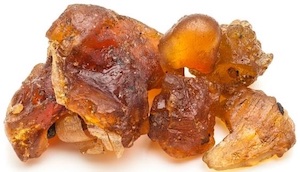The Guggulu tree, scientifically known as Commiphora wightii, is a small, thorny, deciduous shrub native to arid regions of India, Pakistan, and Bangladesh. It thrives in low rainfall, dry areas, and boasts a natural resilience to harsh climates. The tree holds immense significance in traditional medicine, particularly Ayurveda. The resin, a gum-like substance derived from its stem, has a multitude of medicinal uses. This resin is reputed for its anti-inflammatory, anti-arthritic, and cholesterol-lowering properties. The harvesting process involves making incisions in the bark, allowing the precious resin to exude and harden into what we recognize as Guggulu. Its amber nuggets, filled with therapeutic potential, are then meticulously collected. Concerns about the tree’s sustainability, due to overharvesting, have led to conservation efforts, acknowledging the critical role it plays in human health and cultural practices.
Guggulu for Weight Loss
Guggulu, an ancient resin sourced from the mukul myrrh tree, has been valued in Ayurvedic medicine for centuries due to its purported health benefits. Studies suggest that it might be an effective aid in weight management. Its main component, guggulsterone, is said to be responsible for these effects.
Guggulsterone is reported to facilitate weight loss by boosting metabolism, which increases the body’s energy expenditure. This leads to burning of more calories, which could help in reducing body weight. Furthermore, it exhibits cholesterol-lowering properties, which is an added benefit considering that obesity often co-exists with high cholesterol levels.
It’s important to remember, however, that incorporating this herb into your routine shouldn’t substitute for a balanced diet and regular exercise, but rather serve as an addition to a comprehensive weight management strategy.
According to a study published in the “Journal of Dietary Supplements” in 2019, guggulsterone was observed to aid in weight loss, but it’s critical to note that more extensive research is needed to solidify these claims.
When this herb is used along with other 6 powerful ayurvedic herbs for obesity, like vidanga, chitraka, punarnava, amla and ginger it effectively helps in weight loss and in the management of blood sugar levels. Moolika Ayurveda obenil Capsules for weight loss contain all these herbs and it is the best ayurvedic medicine for diabetes.
Guggulu for Diabetes
Guggulu, an Ayurvedic herb, has been recognized for its potential therapeutic properties, including potential glucose management effects, which are highly relevant in managing diabetes. Derived from the resin of the Commiphora mukul tree, it has been traditionally used in ancient Indian medicine due to its multiple health benefits. Research suggests that it could have hypoglycemic properties, potentially contributing to a reduction in blood glucose levels. This is significant for diabetic patients, as uncontrolled blood glucose levels can lead to severe complications. Furthermore, the antioxidant property of this herb may help in combating oxidative stress, which is often elevated in diabetes. The anti-inflammatory benefits can potentially reduce systemic inflammation that is typically observed in people with diabetes. Although promising, more extensive clinical studies are needed to understand the effectiveness and appropriate dosages. Meanwhile, patients should consult healthcare providers before incorporating it into their routine, to avoid any potential interactions with their current treatment plan.
Guggulu for Liver Health
Guggulu, a resin extracted from the Commiphora mukul tree, has been a cornerstone of Ayurvedic medicine for centuries. Recent studies have showcased its potential in promoting liver health. These protective effects are mainly attributed to its antioxidant, anti-inflammatory, and lipid-lowering properties. By modulating liver enzymes, it helps in detoxification processes, strengthening the liver’s capacity to eliminate toxins from the body. Its antioxidant properties help to combat oxidative stress, a significant factor in various liver diseases. Furthermore, guggulu demonstrates impressive lipid-lowering capabilities, which might reduce the risk of non-alcoholic fatty liver disease, a common liver condition.
Ayurveda Medicinal Properties of Guggulu
Guggulu, derived from the Mukul myrrh tree’s sap, holds a significant place in Ayurvedic medicine owing to its myriad medicinal properties. This resinous extract has been traditionally used for managing diverse health issues.
Praised for its tridosha balancing effect, Guggulu can regulate Vata, Pitta, and Kapha doshas in the body. It subdues Vata and Kapha doshas, particularly aiding in joint pain, obesity, and skin disorders. The pacifying effect on Pitta dosha supports digestion, liver function, and cardiovascular health.
In terms of Rasa (taste), Guggulu possesses five of the six tastes – sweet, astringent, bitter, pungent, and sour, lacking only the salty taste. Its primary tastes are astringent, bitter, and pungent, contributing to its potent detoxification properties.
The Gunas (qualities) of Guggulu align with its inherent Rasa. It’s considered to be light (Laghu) and penetrating (Teekshna), enabling it to reach deep tissues, making it a remarkable detoxifying agent.
Guggulu’s Veerya (potency) is Ushna or hot, which is instrumental in its ability to reduce Vata and Kapha. This potency also aids in boosting metabolism, fostering weight management, and promoting healthy skin.
The Vipaka (post-digestive effect) of Guggulu is Katu, translating to a pungent taste after digestion. This aids in reducing toxins, enhancing digestive fire (Agni), and facilitating better absorption of nutrients.
Embracing these Ayurvedic principles, this potent herb is used in conditions like arthritis, obesity, atherosclerosis, and acne. It helps in enhancing immunity, metabolism, and promoting skin health. Guggulu also aids in maintaining healthy cholesterol levels, showcasing its extensive benefits for cardiovascular health. Further research is unlocking even more potential health benefits, making it a precious element in the treasure trove of Ayurvedic medicine.
Reference:
Kumar V, Katiyar A, Sharma PL. Evaluation of the effect of Commiphora mukul gum resin extract on weight gain and lipid profile in high fat diet induced obesity in rats. Journal of Dietary Supplements. 2019;16(2):200-210.
Panda, S., & Kar, A. (2007). Guggulu (Commiphora mukul) potentially ameliorates hypothyroidism in female mice. Phytotherapy Research, 21(1), 99-103.


